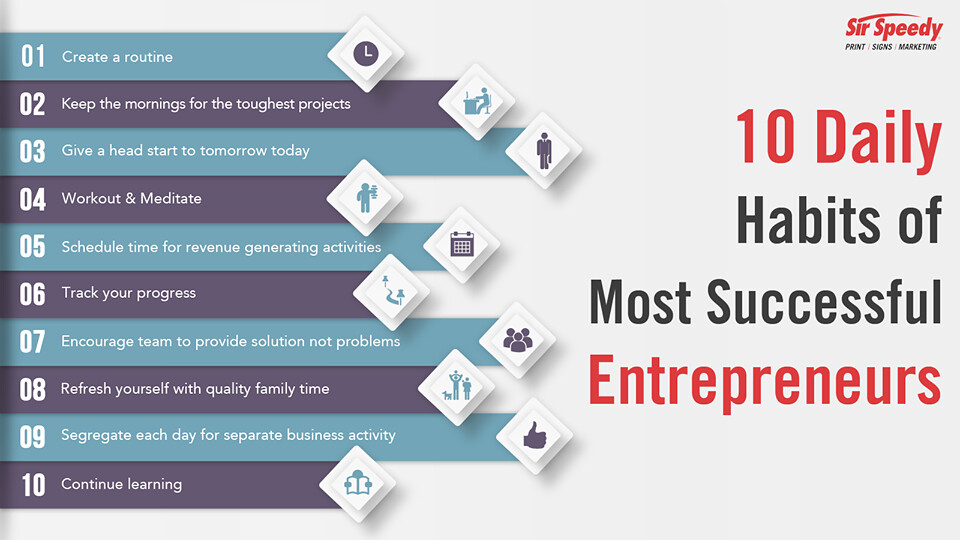Introduction
Success in entrepreneurship isn’t just about groundbreaking ideas or luck—it’s about cultivating the right habits. While talent and timing play roles, consistent behaviors like strategic planning, resilience, and adaptability often separate the winners from the rest. In this guide, we’ll break down 10 actionable habits adopted by top entrepreneurs, complete with steps to integrate them into your daily routine. Let’s dive in!
1. Set Clear, Actionable Goals
Why it matters: Goals act as a roadmap. Elon Musk’s “Mars colonization” vision and Oprah Winfrey’s media empire started with clearly defined objectives.
How to adopt:
-
Use SMART criteria (Specific, Measurable, Achievable, Relevant, Time-bound).
-
Break long-term goals into quarterly milestones.
-
Review progress weekly.
Pro Tip: Create a vision board or use OKR (Objectives and Key Results) frameworks for clarity.
2. Master Time Management
Why it matters: Bill Gates and Indra Nooyi swear by meticulous scheduling to maximize productivity.
How to adopt:
-
Prioritize tasks with the Eisenhower Matrix (Urgent vs. Important).
-
Block time for deep work (e.g., 90-minute focus sessions).
-
Use tools like Trello or Asana to track tasks.
Example: Jeff Bezos allocates mornings to high-impact decisions.
3. Commit to Continuous Learning
Why it matters: Warren Buffett reads 5 hours daily; Sara Blakely credits her success to curiosity.
How to adopt:
-
Dedicate 30 minutes daily to industry news or books.
-
Enroll in online courses (Coursera, MasterClass).
-
Seek mentors for feedback.
Stat: 85% of self-made millionaires read 2+ books/month.
4. Build Resilience
Why it matters: J.K. Rowling and Steve Jobs turned failures into comebacks.
How to adopt:
-
Reframe setbacks as learning opportunities.
-
Practice mindfulness to manage stress.
-
Build a “failure journal” to track lessons.
Quote: “Resilience is accepting your new reality, even if it’s less good.” – Elizabeth Edwards.
5. Network Strategically
Why it matters: Reid Hoffman (LinkedIn co-founder) attributes success to his network.
How to adopt:
-
Attend industry events or virtual summits.
-
Offer value before asking for favors.
-
Nurture relationships via LinkedIn or mentorship programs.
Case Study: Airbnb’s growth exploded after strategic mentorship from Y Combinator.
6. Practice Financial Discipline
Why it matters: Mark Zuckerberg reinvests profits; frugality helped Spanx scale.
How to adopt:
-
Track expenses with tools like QuickBooks.
-
Maintain an emergency fund (6+ months of expenses).
-
Avoid unnecessary debt; negotiate vendor terms.
Stat: 82% of startups fail due to cash flow mismanagement.
7. Stay Customer-Centric
Why it matters: Amazon’s “customer obsession” drove its $1.7T valuation.
How to adopt:
-
Conduct surveys or focus groups.
-
Personalize user experiences (e.g., tailored emails).
-
Resolve complaints within 24 hours.
Example: Zappos’ 365-day return policy built unmatched loyalty.
8. Delegate and Outsource
Why it matters: Richard Branson credits delegation for scaling Virgin Group.
How to adopt:
-
Identify tasks only YOU can do; outsource the rest.
-
Hire freelancers via Upwork for non-core activities.
-
Trust your team with autonomy.
Pro Tip: Use Slack or Microsoft Teams to streamline communication.
9. Prioritize Health and Well-being
Why it matters: Arianna Huffington’s collapse from burnout inspired Thrive Global.
How to adopt:
-
Schedule workouts like business meetings.
-
Meditate daily (apps like Calm help).
-
Aim for 7-8 hours of sleep.
Stat: CEOs who exercise 4x/week report 70% higher decision-making efficiency.
10. Embrace Adaptability
Why it matters: Netflix pivoted from DVDs to streaming; Blockbuster didn’t.
How to adopt:
-
Monitor industry trends via newsletters (e.g., Morning Brew).
-
Test new strategies in small batches (A/B testing).
-
Encourage a culture of innovation in your team.
Quote: “It is not the strongest that survive, but the most adaptable.” – Charles Darwin.
Conclusion
Adopting these habits won’t transform you overnight, but consistency will. Start with 1-2 practices, track your progress, and scale up. Remember, entrepreneurship is a marathon—equip yourself with the right habits to cross the finish line.
FAQs
1. Are entrepreneurial habits different from traits?
Habits are actionable behaviors (e.g., daily reading), while traits are innate qualities (e.g., risk tolerance). The good news: habits can be learned!
2. How long does it take to develop these habits?
Studies suggest 66 days on average, but start small—commit to 21 days of consistency to build momentum.
3. Which habit is most critical for early-stage entrepreneurs?
Goal-setting and financial discipline. Without direction and budget control, even brilliant ideas falter.
4. How do I stay motivated after a failure?
Revisit your “why,” lean on your network, and treat failures as data points—not dead ends.
5. Can I balance entrepreneurship with personal life?
Yes! Schedule downtime, set boundaries, and automate tasks. Remember: burnout kills productivity.
Final Words
Success isn’t about perfection—it’s about progress. By embedding these habits into your routine, you’ll not only think like an entrepreneur but thrive as one. Ready to start? Pick one habit today and build your legacy!
Read More Article About Online Business & Entrepreneurship
